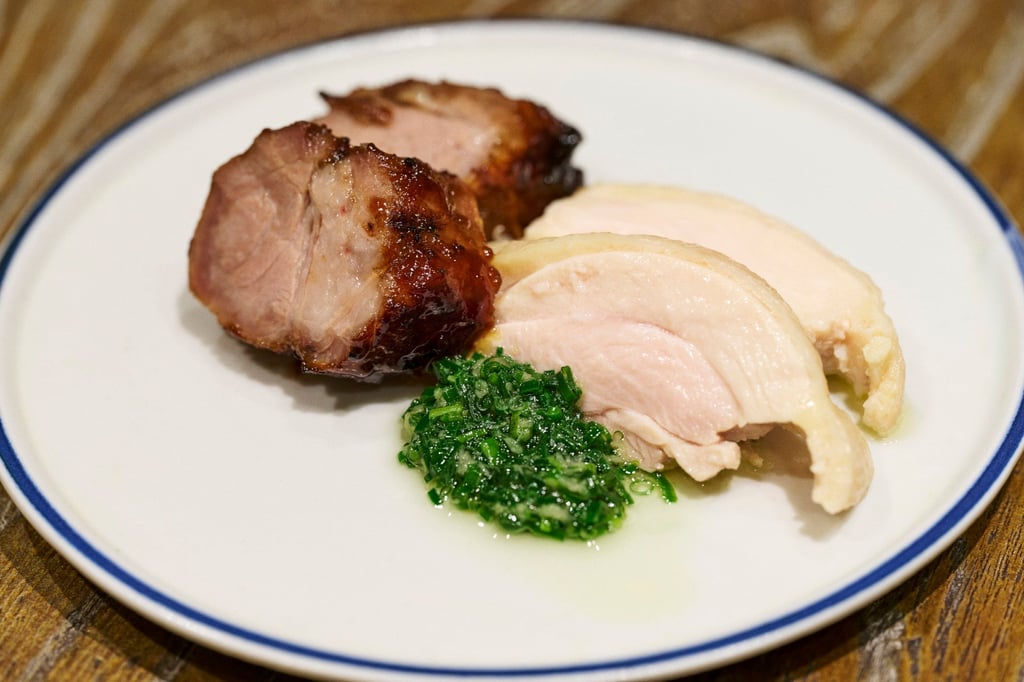Over seven years, she took on front-of-house and back-of-house roles, preparing ingredients, attending to guests, translating and explaining dishes.
It’s such a huge privilege to potentially make someone’s day through food
“I’ve been very fortunate to learn a lot from chef Hasegawa and travel together doing collabs with other restaurants and pop-ups internationally,” Ng says. “Most Japanese chefs tend to keep to themselves. They wouldn’t travel or share techniques and the Japanese food world can be very closed off.”
Having honed her cooking in the kitchens of some of the world’s leading restaurants, Ng discovered that her heart was not in meticulous preparation or a scientific approach to cooking.
“It’s such a huge privilege to potentially make someone’s day through food,” she explains. “For me, cooking is more about sharing and seeing the enjoyment on other people’s faces.”

Ng, who had met Yip years earlier during a collaboration at Den, became the first chef to intern at The Chairman.
“Initially, they rejected me because their kitchen was too small, but I eventually wore Danny down,” she says, laughing. “The team were like Chinese uncles and it was the best month of learning and absorbing everything.
“It wasn’t until working there that I learned to appreciate how sophisticated Cantonese cooking is. I never respected it in the way it should be respected.”

In July, Ng put the skills she has picked up – the casual, laid-back cooking of Den, the seasonal- and local-ingredient-led approach of Kitchen Table and the old-school Cantonese techniques of The Chairman – to the test in her debut, three-day cooking pop-up in London.
Her multi-course Cantonese tasting menu included favourites such as stuffed deep-fried chicken wings, char siu and radish cake, and creative and playful dishes such as stir-fried Jersey royal potatoes and drunken red Carabineros prawns.
Ng built her pop-up menu around British ingredients from suppliers such as Txuleta, which is known for using the meat of old and retired British cows, and Poon’s London, from which she sources dried pork and duck liver sausage.
“I’m trying to find that sweet spot in my cooking that’s balanced, homely and traditional and lets good ingredients shine through,” she says. “It’s so important to adapt to local produce and take note of seasonality. What’s grown locally is grown to suit locals’ tastes.”

There are few young chefs like Ng who are willing to learn the labour-intensive techniques and time-consuming methods needed to cook Cantonese food.
“Most people know Cantonese food for dim sum or sweet and sour pork. I probably won’t touch those dishes, as they’re already done incredibly well. I want to introduce a new category,” Ng says. “I want to focus on the lesser-known side, like soups and vegetables.
“Cantonese food can be very healthy, nourishing and comforting. It’s food that makes you feel content.”
In August 2024, Ng will hold a one-night pop-up at London restaurant Carousel. After that, she plans to have some downtime in Hong Kong and Japan before finding somewhere to open a restaurant in London.
“Imagine you’re going to a friend’s house for dinner,” she says of her planned restaurant concept. “Your friend is from Hong Kong, and her mother is cooking for you, but she’s using slightly better ingredients than what you can find at home, with a slightly more professional kitchen and equipment.
“Basically, I want to open a restaurant so I can be your Asian mum.”







